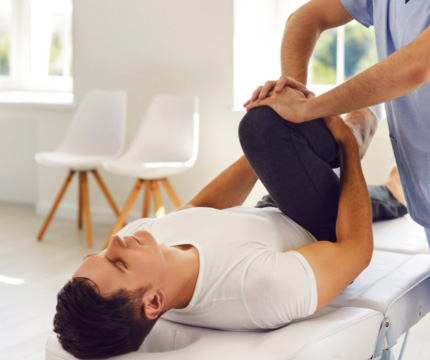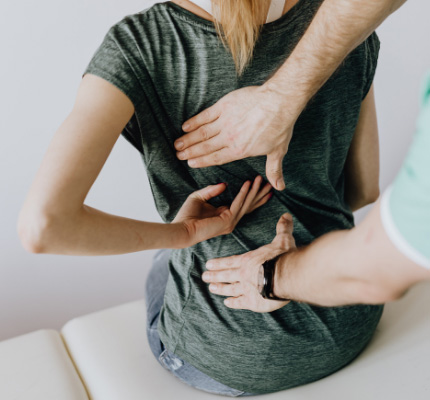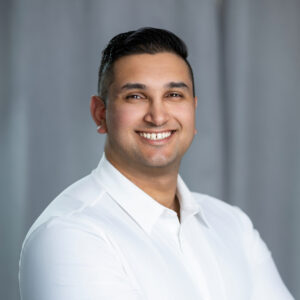Rehabilitation
Rehabilitation After Spine Surgery in Daisy Hill, North Lakes & Eight Mile Plains
Rehabilitation is the process of getting you back into your normal pattern of activities after surgery.
Surgery is an event that happens on a particular day at a particular hospital. But rehabilitation is a process that may take many weeks or months as you strengthen those parts of your body affected by the operation.
Rehab usually starts as soon as possible after your operation, usually before you leave the hospital. Some types of rehab continue during an extended hospital stay. Usually, though, your rehab happens through an outpatient clinic or by seeing a physiotherapist of your choice in private practice.


When can Rehabilitation After Spine Surgery Help?
Rehabilitation may help after:
Within 4-8 hours of your surgery, hospital physios may encourage you to start moving. Once you’re home, your knee rehab continues, often involving exercises like pedalling a stationary bike, knee extensions and heel-to-toe walking exercises, progressing to more challenging exercises as directed by your physiotherapist.
The anterior cruciate ligament is a strong band of tissue that connects the thigh bone to the shinbone at the knee. It can be torn during sports like basketball, skiing or soccer where your knee may have to twist at speed.
Rehab after ACL surgery starts small, with simple exercises like bending and straightening your knee and regaining strength in your quads and hamstrings.
Once you’re off crutches and have regained full range of motion, your physiotherapist may recommend more intense exercises like:
- Squats
- Calf and hamstring stretches
- Standing on one leg.
As time goes on, you may be encouraged to return to activities like swimming, cycling and jogging, as directed by your physio. As your fitness improves, rehab focuses on helping you return to your chosen sport.
Rehab after hip replacement surgery starts in your hospital bed with small exercises like ankle rotations, knee bends, butt clenches and moving your legs from side to side.
Then we move on to a program of exercises to be done while standing or walking, eventually progressing to going up and down stairs.
It can take several months to improve your hip mobility, muscle strength and endurance. Be patient with yourself and diligent in doing your exercises. You’ll get there.
Spinal surgery alone is only half of the equation. There is a recovery period in the hospital, followed by months of rehabilitation. Taking steps to support your recovery is essential otherwise you might find yourself feeling disheartened that you’re still in pain months later.
In order to get the best results, you can expect to work with your physiotherapist on your rehabilitation for at least 6 to 10 weeks.
A rehabilitation program will usually involve:
- Focusing on your muscles and movement with a personalised treatment program to build your muscle strength and help you regain a better range of movement. You don’t want to undo all the good work by overdoing it!
- Address the underlying causes of pain. Factors like weight, posture, and biomechanics may be contributing to discomfort – these are all things your physiotherapist can help with.
- Answering your questions. With a wealth of experience in this area, our team are happy to answer your questions throughout your recovery.


Rehabilitation After Spine Surgery at The Brisbane Spine Clinic
If you’ve suffered a musculoskeletal injury or condition that requires surgery, we’re here to help you prepare for the operation and recover as fully as possible afterwards. We support you through each step of that journey (sometimes literally!) with tailored exercises to improve your strength, mobility and stamina.
Request an appointment
More services
Our Physiotherapists
Yu-Tsung (Justin) Lin
Co-Founder and Senior Musculoskeletal Consultant
Sang Bin (Leo) Hyun
Senior Spinal Consultant
Chun Man (Kelvin) Choi
Physiotherapist and Accredited Exercise Physiologist
Marco Lin
Physiotherapist & Clinical Exercise Physiologist
Raymond Sidhu
Physiotherapist
Yuji Chen
Physiotherapist
Michael Pham
Physiotherapist
Matthew Choi
Physiotherapist
Sean Chiang
Physiotherapist
Raymond Lin
Physiotherapist
Disclaimer
All information is general in nature. Patients should consider their own personal circumstances and seek a second opinion










